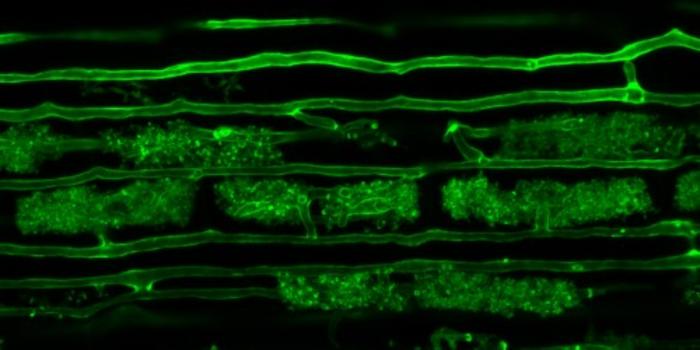Researchers at the John Innes Centre have made a groundbreaking discovery that could significantly transform agricultural practices by enhancing the interaction between plant roots and beneficial soil microbes. This revolutionary finding not only sheds light on the biological mechanisms that underpin these microbial associations but also paves the way for potential solutions to the global fertilizer crisis. In an era where environmental concerns are paramount, this research offers a glimmer of hope that farming can evolve toward more sustainable practices.
The essence of this research lies in the relationship between plants, specifically legumes, and their symbiotic partners: nitrogen-fixing bacteria known as rhizobia and arbuscular mycorrhizal fungi (AMF). These microorganisms are crucial for boosting nutrient uptake by plants, thereby enhancing growth and resilience against adverse environmental conditions. The study focuses on a mutant strain of the legume Medicago truncatula, whereby scientists identified a genetic modification that alters how the plant communicates and interacts with these essential microbes. Specifically, the identified mutation impacts a gene involved in calcium signaling pathways, which play a critical role in the symbiotic relationship between plants and microbes.
To fully understand the implications of this mutation, it’s necessary to delve into the process of endosymbiosis that was observed. Endosymbiosis refers to the phenomenon where one organism lives within another. In agriculture, this relationship is increasingly recognized for its ability to enhance soil nutrient availability and plant health. By enabling legumes to forge beneficial partnerships with rhizobia and AMF, this research demonstrates the potential of natural biological processes as alternatives to chemical fertilizers which have been associated with negative environmental repercussions, such as soil degradation and water contamination.
In intensive farming scenarios, however, endosymbiotic relationships face significant challenges. Traditional agricultural practices often rely on nutrient-rich soils that are saturated with chemical fertilizers, creating a conflict with the nutrient-poor conditions that generally favor endosymbiosis. This presents a significant barrier to the widespread adoption of microbial partnerships in conventional farming systems. However, the findings from the John Innes Centre suggest a way forward. The researchers have shown that the gene mutation propagates enhanced endosymbiosis even in nutrient-rich soils typically found in modern agricultural settings.
A notable aspect of this innovation is the research team’s successful application of these genetic insights to wheat, a staple crop in global agriculture. Remarkably, they found that the same gene mutation which improved symbiotic colonization in legumes also conferred similar benefits on wheat plants in field conditions. This means that the potential for enhancing nutrient uptake across major crops is within reach, which could have profound implications for food security and sustainable farming practices.
Dr. Myriam Charpentier, who leads the research group, emphasized the transformative prospects of their findings, stating that they offer innovative solutions for agricultural sustainability. She highlighted the excitement surrounding the potential to reduce inorganic fertilizer usage while simultaneously promoting healthier crop production through naturally occurring biological processes. This breakthrough not only makes strides in agricultural science but also underscores the vital link between fundamental research and its application to societal challenges such as climate change and food scarcity.
As scientists continue to unlock the complexities of root endosymbiosis, new fronts are opening in our understanding of plant-microbe interactions. The implications are not merely academic; they resonate widely across agricultural sectors, where producers are increasingly seeking methods to enhance crop yields and resist diseases while minimizing environmental harm. The research points to a future where agricultural productivity could soar in a manner that is eco-friendly and economically viable.
Further, this advancement in genetic understanding enriches the discourse on calcium signaling, a pathway that has been previously flagged as essential for establishing root endosymbiosis. By elucidating the specific mechanisms through which calcium oscillations influence flavonoid production—which in turn promotes microbial interaction—the study contributes foundational knowledge that could guide future research efforts aimed at improving agricultural resilience.
The discovery of the calcium signaling mechanism offers insights that extend beyond agriculture. It presents a template for the examination of other complex biological interactions, potentially sparking innovations across diverse sectors ranging from sustainable horticulture to eco-friendly pest management. As the pressure to respond to global challenges intensifies, such findings illuminate the path forward, combining the benefits of scientific inquiry with practical applications.
Root endosymbiosis stands at the forefront of a paradigm shift in agricultural science. As more farmers and researchers uncover the advantages of harnessing microbial relationships, we may witness a trend toward reduced chemical reliance, improved soil health, and ultimately, more resilient ecosystems. The merging of traditional practices with modern genetic advancements can create a sustainable blueprint that harmonizes agricultural productivity with environmental stewardship.
This research is sure to fuel further inquiry into the genetic and biochemical underpinnings of plant-microbe interactions. It exemplifies how forward-thinking scientific exploration can yield tangible solutions to pressing challenges, showcasing the power of collaboration between disciplines in the quest for sustainable farming practices. As academia continues to unravel the intricacies of biology, the applications of such discoveries will increasingly resonate in the day-to-day practices of farmers worldwide.
In summary, the revelations from John Innes Centre researchers not only open the door for enhanced crop resilience but also set the stage for agricultural systems that align closely with ecological principles. This study could well be a driving force in shaping the future of farming, where biodiversity and sustainability reign supreme, making it a vivid testament to the transformative power of scientific research aimed at improving life on Earth.
Subject of Research: Enhancing plant-microbe interactions through genetic modifications for sustainable agriculture
Article Title: Autoactivate CNGC15 enhances root endosymbiosis in legume and wheat
News Publication Date: 15-Jan-2025
Web References: Nature Article
References: DOI: 10.1038/s41586-024-08424-7
Image Credits: Edmund Bridge
Keywords: Sustainable agriculture, endosymbiosis, plant microbe interactions, calcium signaling, nitrogen fixing bacteria, arbuscular mycorrhizal fungi, crop production, wheat, legumes, environmental science.




